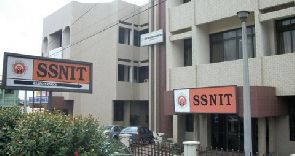
The Social Security and National Insurance Trust (SSNIT) says it has made significant savings by deleting ghost pensioners on the Scheme’s payroll.
According to SSNIT, as at the end of September 2018, savings made so far can be put at GHC20 million, after deleting 6, 452 from the payroll.
SSNIT in February this year, begun the clean-up exercise to delete ghost names its payroll. The Trust advised the BoG to return pension funds which had been unclaimed for a period of six months.
Following the advice, the BoG issued a notice to local banks, directing them to ensure that “all SSNIT pensioners’ bank accounts in respect of which there have been no withdrawals of monthly pension paid by SSNIT into that account over a period of six months or more should be returned to the designated SSNIT account at the Bank of Ghana.”
SSNIT boss on ‘ghost names’ clean up
Speaking to JoyBusiness after a media engagement in Accra, the Director General of SSNIT, Dr John Ofori-Tenkorang said they are hoping to increase savings being made to about GHC26 million by December 2018.
He added that “every month we are saving over GHC2 million and what this means that the pension expenditure is going to slow down, helping make the fund sustainable”.
This move the director added is part of broader cost-cutting measures being implemented by the Trust.
Would this cost-cutting measures affect payment of benefits?
Dr Ofori-Tenkorang however assured that this cost-cutting measures would not affect pension payout to beneficiaries, adding that “Despite these cost-cutting measures, we have not reneged on our responsibility of paying benefits”.
Payments
He added that a total of GH¢2.2 billion was paid to 189,549 pensioners and other beneficiaries in 2017 as compared to a payment of GH¢1.7 billion to 174,164 pensioners and other beneficiaries in 2016. This is an increase of 29.41% of the previous year’s benefit payouts. Indeed, in January 2018, all pension payments were increased by 10%. The Minimum Pension, which is above the statutory monthly Minimum Wage for the working population, has been maintained.
Other cost-cutting measures
According to SSNIT other cost-cutting measures has yielded some significant savings. This includes foreign travels, competitive procurement and Internal Audit on ICT systems.
Foreign Travels
Travel and accommodation expenses for the period ended 30th September 2018, was GH¢1.57 million as against a budgeted amount of GH¢ 8.34 million. This indicated a favourable variance of 81% as a result of a significant reduction in foreign travels during the period.
Also, the amount spent on travel and accommodation was drastically reduced to GH¢1.9 million in 2017 compared to an actual spend of GH¢8.3 million in 2016.
This constitutes a 77% reduction. In consultation with the Executive Committee, the Trust’s Travel Policy has been amended so that all employees, including the Director-General, fly Economy Class for trips below 4 hours duration.
Competitive Procurement
All Procurement activities within the Trust have been centralised. Only the Procurement Department has the mandate to procure goods and services. Sole sourcing has been cut down. Competition has been introduced in the procurement of airline tickets, as required by the Public Procurement Act and this has recorded significant savings.
Stringent standards and controls have been instituted to ensure that committees that evaluate all procurement tenders carry out their duties professionally and apply the law and the correct procedures for awards of contracts to ensure value for money.
It is based on some of these measures that the Director-General of the Trust was recognized as the “Procurement Transformation CEO of the Year” at the Ghana Procurement & Supply Chain Awards (GPSCA) held in September 2018.
Internal Audit on ICT systems
Management embarked on a comprehensive audit of the Trust’s ICT systems and have identified several areas in which the Trust can recover certain costs and also cut down on recurrent support and maintenance expenditure.
A recent re-negotiation of agreements on some ICT infrastructure, support and license fees has resulted in the savings of $8.52 million to the Trust. About half of this is a recurrent expenditure.
A newly signed Service Level Agreement (SLA) for three (3) years is saving the Trust two million $2,000,000.00 compared to the previous maintenance contract.
Also, an amount of $15,281,167.87 and GH¢16,019,579.46 is to be claimed as refunds from one of the IT solution vendors.
The retooled internal audit department has further unveiled another $ 6,944,467.18 to be claimed from a software provider.
Value-for-Money Audits
Management is conducting a value-for-money audit on several of the Trust’s ongoing real estate construction projects, the results of which will serve as a basis for re-negotiation of the construction contracts when necessary.
Status of SSNIT’s investment
Dr Ofori-Tenkorang also maintained that it has been very prudent with its investment, as it works to improve contributors’ benefits.
It has also frozen new real estate investments in the short to medium term until SSNIT’s portfolio has been rebalanced.
SSNIT’s Investment Guidelines are also being reviewed in line with the new asset allocation policy and emerging trends.
Breakdown of investment performance
The Trust’s investment portfolio registered a 5.77% real return in 2017 as against -5.93% in 2016. This performance was above the external actuarial target of 3.25%.
The total investment assets of the Trust as at September 2018 was GH¢9.38 billion.
This represents a growth of 2.4% in asset value compared to the Sept 2017 value of GH¢9.16 billion and an increase of 1.4% compared to the December 2017 value of GH¢9.25 million.
The Marketing Department, at the Office of Corporate Affairs, has been tasked to intensify marketing activities to sell off real estate housing units as and when they are completed without waiting for the total completion of the projects, SSNIT boss added.
The Trust Hospital Company Limited (a facility fully owned by SSNIT) since its incorporation in 2010. The amount paid was GH¢597,979. Another investee company, Labadi Beach Hotel, also declared a dividend of GH¢1 million for 2017.
This amount was a huge increase considering that the company booked a loss in 2016.
The Trust’s Treasury Policy has been revised and now SSNIT places funds with commercial banks and other financial institutions at Treasury bill rates plus a minimum of 3%.
A significant amount of SSNIT funds was invested in T-bill rates plus 1% in the past, but under the new treasury policy, some funds were invested at T-bill rates, plus 5.3 %. The Trust ensured all these placements had security cover.
At the end of 2017, the value of SSNIT’s cash and near-cash instruments stood at about GH¢1 billion as opposed to GH¢217 million at the end of 2016.
The value of the Trust’s assets increased by GH¢1.376 billion in 2017 from GH¢8.4 billion to GH¢9.776 billion, as against a decrease of GH¢404.481 million in 2016.
1,464 affordable housing units at Borteyman have been completed and sales are still ongoing. All contractors who have submitted their certificates have been paid. Also, the Trust is on track to complete about 1072 affordable housing units at Asokore Mampong by December 2018 within budget.
SSNIT targets Informal Sector
The Trust says is it working to venture into operating a scheme for those in the informal sector.
According to the Director General, “Substantial progress will be made in these areas to turn the Trust around and position it for further growth that will positively impact our national development in the coming year.”
Source: myjoyonline.com




